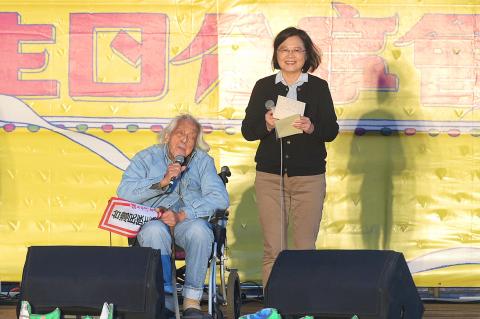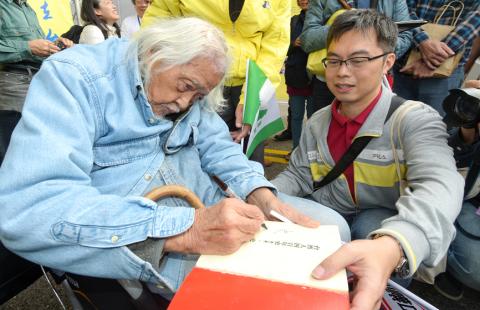Hundreds of people yesterday joined an early celebration in Taipei for Taiwanese independence pioneer Su Beng’s (史明) 100th birthday, while Su urged President Tsai Ing-wen (蔡英文) to ensure that Taiwanese could become the master of their own nation.
The block party on Ketagalan Boulevard was organized by dozens of pro-independence groups, musicians, performers and publishers, which featured performances, speeches and a book fair.
Tsai made a brief appearance at about 5pm, joining Su on stage to give him a hug and some gifts.

Photo: Chang Chia-ming, Taipei Times
She read a birthday card she had written to him: “I am thankful that you have proven to Taiwanese with your life that people can earn dignity if they persist with their dreams.”
Su, a vocal supporter of Tsai during her presidential campaign, thanked her and other participants, saying that although he rarely celebrated birthdays in the decades after he left Taiwan at age 20, he felt blessed by the birthday wishes of fellow independence advocates.
Life is “worth living” with a lifelong commitment to Taiwan and its people, he said, adding that he had achieved little over his decades of activism.

Photo: Chang Chia-ming, Taipei Times
Su asked Tsai to lead her administration in line with public opinion to achieve the goal of “making Taiwanese their own master,” adding that this is an optimal time to achieve independence.
“The world has changed greatly. We need to be more hard-working to understand the public while working in line with public opinion,” Su said.
“President Tsai Ing-wen can hopefully put forward policies that can correspond to global trends and satisfy the need of Taiwanese,” he said.
“The train of progress has started. This is the first time that Taiwan has had a female president in its 400-year history. The nation has to do the right thing and be united and persistent while preventing the Chinese Nationalist Party [KMT] from regaining power to become a leading nation on equal footing with other nations,” he said.
Tsai’s efforts alone cannot achieve the goal; it requires everyone’s commitment, he said.
Su, whose given name is Shih Chao-hui (施朝暉), was born in Taipei on Nov. 9, 1918. According to the traditional Chinese way of counting birthdays, that makes him 100 years old.
He left Taiwan to study at Japan’s Waseda University.
After graduating in 1942, he went to China, where he worked undercover as part of the Chinese Communist Party’s anti-Japanese efforts, but eventually grew dissatisfied with the party.
He returned to Taiwan in 1949, where he founded the Taiwan Independence Association a year later.
He attempted to organize an armed resistance against the KMT, but was forced into hiding in 1951. He escaped by boat to Japan in May 1952, but was arrested and served time for illegally entry,
However, after the KMT announced he was wanted in connection with a plot to assassinate Chiang Kai-shek (蔣介石), Japan gave him political asylum and he lived there in exile until 1993, when he snuck back into Taiwan by boat.
He has advocated Taiwanese nationalism as a foundation to abolish the Republic of China framework.
His 1962 book, Taiwan’s 400 Year History, is considered a landmark work of the independence movement.

SECURITY: As China is ‘reshaping’ Hong Kong’s population, Taiwan must raise the eligibility threshold for applications from Hong Kongers, Chiu Chui-cheng said When Hong Kong and Macau citizens apply for residency in Taiwan, it would be under a new category that includes a “national security observation period,” Mainland Affairs Council (MAC) Minister Chiu Chui-cheng (邱垂正) said yesterday. President William Lai (賴清德) on March 13 announced 17 strategies to counter China’s aggression toward Taiwan, including incorporating national security considerations into the review process for residency applications from Hong Kong and Macau citizens. The situation in Hong Kong is constantly changing, Chiu said to media yesterday on the sidelines of the Taipei Technology Run hosted by the Taipei Neihu Technology Park Development Association. With

CARROT AND STICK: While unrelenting in its military threats, China attracted nearly 40,000 Taiwanese to over 400 business events last year Nearly 40,000 Taiwanese last year joined industry events in China, such as conferences and trade fairs, supported by the Chinese government, a study showed yesterday, as Beijing ramps up a charm offensive toward Taipei alongside military pressure. China has long taken a carrot-and-stick approach to Taiwan, threatening it with the prospect of military action while reaching out to those it believes are amenable to Beijing’s point of view. Taiwanese security officials are wary of what they see as Beijing’s influence campaigns to sway public opinion after Taipei and Beijing gradually resumed travel links halted by the COVID-19 pandemic, but the scale of

Pope Francis is be laid to rest on Saturday after lying in state for three days in St Peter’s Basilica, where the faithful are expected to flock to pay their respects to history’s first Latin American pontiff. The cardinals met yesterday in the Vatican’s synod hall to chart the next steps before a conclave begins to choose Francis’ successor, as condolences poured in from around the world. According to current norms, the conclave must begin between May 5 and 10. The cardinals set the funeral for Saturday at 10am in St Peter’s Square, to be celebrated by the dean of the College

TRADE: A mandatory declaration of origin for manufactured goods bound for the US is to take effect on May 7 to block China from exploiting Taiwan’s trade channels All products manufactured in Taiwan and exported to the US must include a signed declaration of origin starting on May 7, the Bureau of Foreign Trade announced yesterday. US President Donald Trump on April 2 imposed a 32 percent tariff on imports from Taiwan, but one week later announced a 90-day pause on its implementation. However, a universal 10 percent tariff was immediately applied to most imports from around the world. On April 12, the Trump administration further exempted computers, smartphones and semiconductors from the new tariffs. In response, President William Lai’s (賴清德) administration has introduced a series of countermeasures to support affected